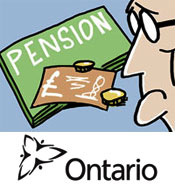This is an archive of news stories and research from the National Union of Public and General Employees. Please see our new site - https://nupge.ca - for the most current information.
Bill 120, Securing Pension Benefits Now and for the Future Act, 2010 was passed at second reading in the Ontario legislature
 Toronto (5 November 2010) – Ontario’s Finance Minister Dwight Duncan introduced what he called “Phase II” of pension reform in the legislature last month. Bill 120, Securing Pension Benefits Now and for the Future Act, 2010, was passed at second reading yesterday and referred to the Standing Committee on Finance and Economic Affairs.
Toronto (5 November 2010) – Ontario’s Finance Minister Dwight Duncan introduced what he called “Phase II” of pension reform in the legislature last month. Bill 120, Securing Pension Benefits Now and for the Future Act, 2010, was passed at second reading yesterday and referred to the Standing Committee on Finance and Economic Affairs.
Phase I of Ontario's pension agenda was packaged under Bill 236, the Pension Benefits Amendment Act, which received royal assent on May 18 2010 but many sections of Bill 236, have not yet been proclaimed and many sections require regulations which have yet to be formulated. Phase I legislation provided for changes such as immediate vesting, notice of all proposed amendments, and creating advisory committees for plan members.
Phase II of Ontario’s reforms, Bill 120, takes steps to increase benefit security and clarifies and simplifies existing laws but there is no effective date for the legislation and there is a lack of detail about several of the Bill’s provisions.
The main changes contained Bill 120 are as follows.
- Pension plan amendments that increase pension benefits will not be permitted if they bring a plan's funded status below a prescribed level of 85 percent on either a solvency or ongoing basis.
- If a plan sponsor wants to amend a pension plan or agrees to changes through collective bargaining that would bring the funding below this level, then the pension fund would have to be topped up in order for the amendment to be valid.
- Employer (and employee) contribution holidays will be permitted will not be permitted if the pension plan documents prohibit them and for those plans that permit them a funding cushion of 105 percent would be required.
- Employers will be entitled to use letters of credit to fund solvency deficiencies provided they not exceed 15 percent of the plan's solvency liabilities. A plan sponsor will have to notify the superintendent of the Financial Services Commission of its intention to fund a plan in this manner. The costs of obtaining the letter of credit may not be paid from the pension fund.
- Jointly sponsored pension plans will be exempt from funding solvency deficiencies, provided that such plans are amended.
- With respect to surplus assets in a pension plan, if a does not provide for the withdrawal of surplus assets by the employer on an ongoing basis or on a plan wind-up, the plan will be deemed to prohibit such withdrawals.
- An employer, however, may enter into a written agreement with plan members to provide for the withdrawal of surplus assets, provided the agreement has been supported by at least two-thirds of plan members or with the union that represents the members.
- Plan sponsor will be allowed to be paid for fees and expenses in respect of the pension plan and pension fund, unless the plan documents indicate otherwise. ").
- The legislation allows for the transfer of pension plan members from the Ontario public service to the federal public service with the protection of members' pension benefits.
- Bill 120 requires that the Pension Benefits Act to be reviewed at least every five years.
The government has scheduled third reading of the bill for December 2, with no more than one hour of debate. It is therefore likely to pass in early December.
NUPGE
The National Union of Public and General Employees (NUPGE) is one of Canada's largest labour organizations with over 340,000 members. Our mission is to improve the lives of working families and to build a stronger Canada by ensuring our common wealth is used for the common good. NUPGE
More information:
